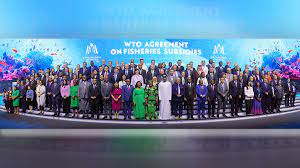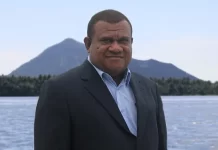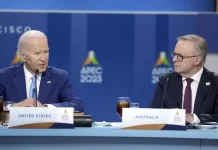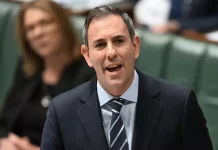Eight WTO members deposited their instruments of acceptance of the Agreement on Fisheries Subsidies on 26 February at the opening of the 13th Ministerial Conference (MC13), putting the historic agreement for ocean sustainability on track for entry into force at record pace.
Ministers of Brunei Darussalam, Chad, Malaysia, Norway, Rwanda, Saudi Arabia, Togo, and Türkiye presented their instruments of acceptance to Director-General Ngozi Okonjo-Iweala in a ceremony at MC13 taking place in Abu Dhabi, United Arab Emirates.
The latest instruments of acceptance bring the total number of WTO members that have formally accepted the Agreement to 69, with a total of 70 expected during MC13.
“With the 70 we’ll have this week, we’ll now have 40 members to go, so the countdown towards entry into force can now start in earnest,” DG Okonjo-Iweala said at the MC13 opening ceremony.
“I hope remaining members can work fast to help us allow entry into force by my birthday on the 13th of June of this year, which will also mark two years since MC12. When we succeed, it will be the fastest entry into force of any WTO agreement–and I know we will,” she said.
Adopted by consensus at the WTO’s 12th Ministerial Conference (MC12), held in Geneva on 12-17 June 2022, the Agreement on Fisheries Subsidies sets new, binding, multilateral rules to curb harmful subsidies, which are a key factor in the widespread depletion of the world’s fish stocks. In addition, the Agreement recognizes the needs of developing and least-developed countries and establishes a fund to provide technical assistance and capacity building to help them implement the obligations.
The Agreement prohibits support for illegal, unreported and unregulated (IUU) fishing, bans support for fishing overfished stocks and ends subsidies for fishing on the unregulated high seas.
Members also agreed at MC12 to continue negotiations on outstanding issues, with a view to making recommendations by MC13 for additional provisions that would further enhance the disciplines of the Agreement.
DG Okonjo-Iweala added: “Completion of ‘Fish 2’ and its rapid entry into force would really put WTO members at the forefront of action on sustainability of our oceans and would safeguard the livelihoods of the 260 million people who depend on these oceans. Ending the estimated US$22 billion per year in harmful fisheries subsidies would free up resources that subsidisers can repurpose, whether to help people domestically or to help the wider world, such as through green financing for poor countries, or support for climate-related loss and damage”















